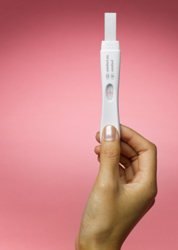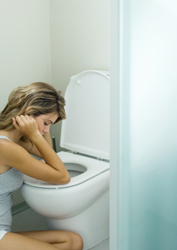Suspecting You Are Pregnant
Starting at the beginning, if you have been trying for a baby then like myself you will be looking for every sign and symptom of pregnancy possible and analysing your bodies every change in hope that you have been successful this month.
There are a few classic signs and symptoms that may make you suspect you are pregnant before you complete a pregnancy test to confirm so.
Missed Period
Two weeks after you have conceived your baby you may miss your regular period. Pregnancy is one of the most common reasons for missing a period however it is not the only reason. Jet lag, severe illness, shock, bereavement, stress and surgery can also cause you to miss a period; therefore it is not always an absolute sign that you are in fact pregnant.
Additionally, periods don’t always stop throughout pregnancy; some women have light periods up to the sixth month or even for the entire duration of the pregnancy.
You may also experience some implantation bleeding about 8 days after ovulation which can cause spotting around your normal period time therefore can be misinterpreted as your regular period. This means that it is often easy to overlook the sign of a missed period and that you are indeed pregnant.
Breast Changes
In the early stages of pregnancy you may notice some changes to your breasts in particular they might become quite lumpy and sore to touch. Your areolas and nipples may also deepen in colour and darken. This however can be a sign of hormonal imbalance and not a sign that you are pregnant. Your veins in your breasts may also start to look more prominent and appear larger.
Frequent Urination
Soon after the implantation of the embryo, human chorionic gonadotropin (hCG) is produced which increases the blood supply to your pelvic area leading to pelvic congestion.
You may find your bladder irritable. You may be feeling the need to go to the bathroom more frequently, even if it is to expel the smallest amount of urine.
This can affect you as soon as one week after conception.
Tiredness and Fatigue
The hormone progesterone will be in significant volumes in your body when you are first pregnant. This hormone along with an increased metabolism which supports the
development of your baby and its organs means your body has to do much more work than usual. This extra work makes you feel tired and fatigued. The only thing you can do is to rest for both your sakes.
Of course tiredness and fatigue can be for many reasons and certainly are not a sign of pregnancy alone.
Morning Sickness
Morning sickness can come on anytime of day and generally affects women a few weeks after conception, some lucky ones might not even have sickness at all. However you may feel a little nausea a couple of days following conception, and although morning sickness usually gets better in the second trimester it can last for the entire duration of the pregnancy. Some might even miss out at first but suffer from vomiting and nausea months down the track, even in the third trimester.
Generally morning sickness is brought on if you have not eaten enough or your blood sugar levels are low. Having small meals throughout the day may help rather than 3 big meals, also try having dry crackers on hand for those times you are feeling nauseated.
Change in Taste & Cravings
Due to the chemical content of your blood and the rise in hormone levels you can experience a change in taste in your mouth; some women describe it as a metallic taste. Often foods you once loved the taste of you won’t be able to stand, tea and coffee are two common examples. This can be considered a good thing as during pregnancy you should cut down your caffeine intake.
Cravings are another symptom of pregnancy, however really cannot be explained scientifically. Pregnant women have even been said to cave inedible substances, perhaps our body’s way of trying to make up for mineral deficiencies?
Altered Sense of Smell
Another of your senses that may be affected and altered during pregnancy is your sense of smell. You may notice that it is much more acute and some everyday odours and cooking smells can make you feel nauseous. Because your own skin’s chemistry is altered you may even find your own perfumes smell is no longer appealing to your senses.
















